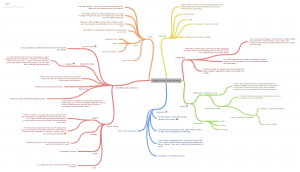I’m a fan of games, simulations and gamification to support learning. This includes both playing games and also building games (check out the Game Design Toolkit (and the associated proposal and reflection)).
As discussed in this lesson plan critique, gaming needs to be good to be effective. Design, whether for a course, learning experience, or a game – is challenging. Some of the better gaming / simulation experiences I’ve encountered to date include “The Phoenix Project: A Business Simulation“, “G2G3 DevOps Simulation” and “Lego4Scrum.” I’m a big fan of the G2G3 simulation as I’ve had the chance to co-facilitate it a few times now and always come away impressed with the engagement, learning and overall experience. Of course, smaller, quick games such as the coin game, ball-point game, delegation poker are some other, excellent options.
In further exploring gaming, I had a great experience in the Digital Games, Learning and Pedagogy (Course Overview, Summary)summer session at UBC. A summary of key learnings from the session are provided in this mind map:
We started by digging into Games, Play and Work and ended up building our own games – which for me, resulted in a game called “Pot Luck?” – a card-based game with a supporting augmented reality (AR) experience. Some further summary thoughts can be found in this assessment. Along the way, I really like the comparison of some games to “chocolate covered broccoli.” The idea, that there’s just a game facade on top of a non-fun learning experience – thinking that by calling it a “game” it is now somehow good and fun.
In The End of Gamers, which has parallels to the idea of the “end of teachers”:
A mixed blessing emerges as videogames become commonplace, consumed by many and showing up in many forms. However, the domestication, demystification and democratization also will lead to tameness and perhaps uninteresting media. For those that seek the wild, exotic or different – the democratization of tools and distribution are still available. However, they might have to dig deeper, be more creative, more outlandish, and more shocking in order to differentiate. Just building a “videogame” or being a “gamer” won’t be enough as everyone fits those labels!
In our new ways of learning, we all become students and teachers. Learning becomes demystified, democratized and decentralized. We might not need to label anyone a “teacher”, as everyone will fit that label.
